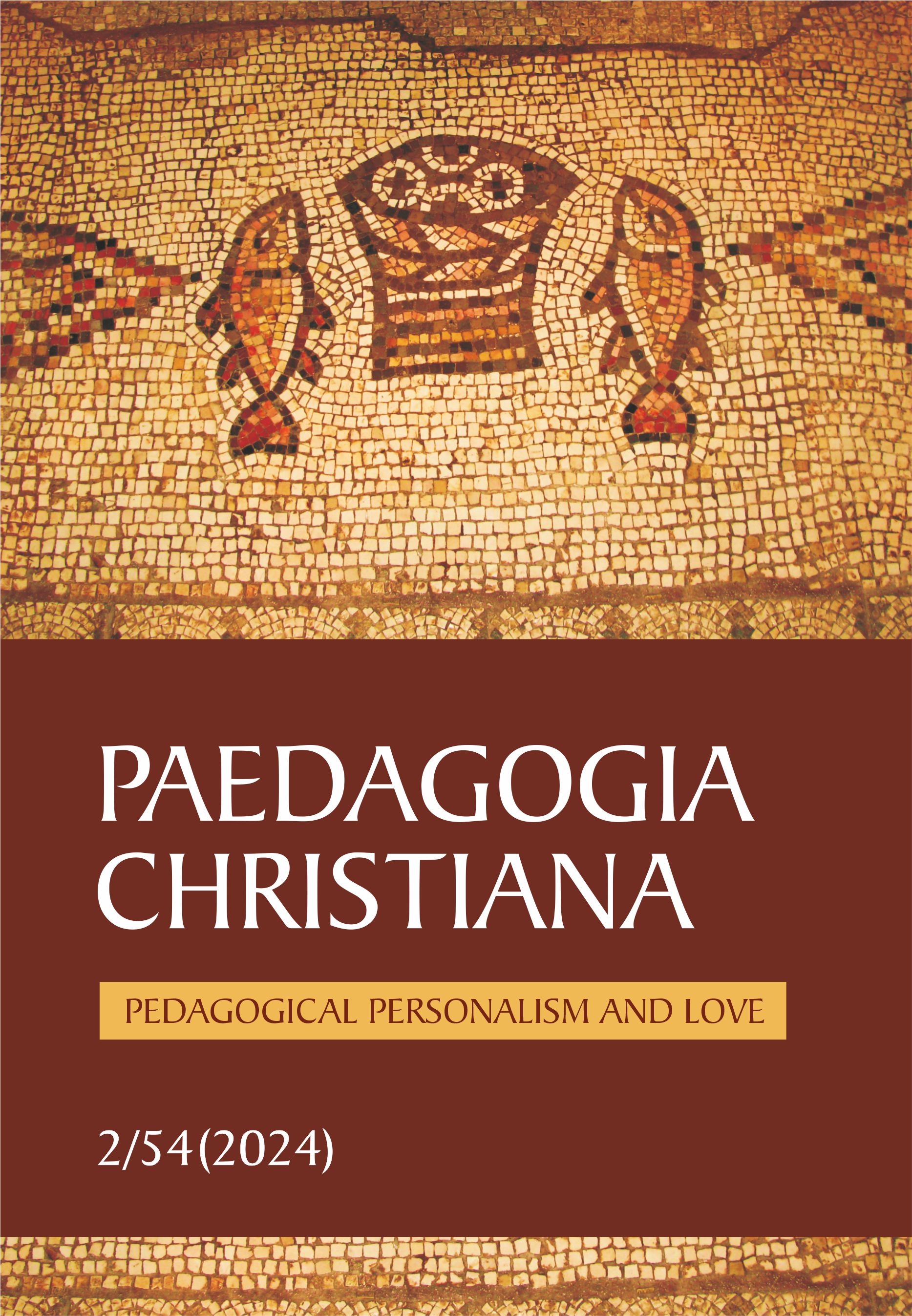Love and Social Generativity
DOI:
https://doi.org/10.12775/PCh.2024.016Keywords
social generativity, pedagogy of reciprocity, education and care, pedagogical anthropology, intergenerational relationAbstract
This paper relates love to generativity through pedagogical anthropology, in which the person and environment can be seen as a network of participatory relationships. In fact, ‘love is the unity of the community as the vocation is the unity of the person. Love is not added to the person as more, as a luxury: without love the person does not exist’ (Mounier, 1961, p. 521). Therefore, we introduce the concepts of human and social generativity and their dynamics (desire, bringing into the world, taking care and letting go) as well as their effects. Then, we analyse intergenerational relations as an example of donative love.
References
Alici, L. & Pierosara, S. (Eds.). (2022). Cura e responsabilità. Tra prossimità e distanza. Milano: FrancoAngeli.
Allen, R. T. (2014). Ethics as scales of forms. Newcastle upon Tyne, UK: Cambridge Scholars Publishing.
Arendt, H. (1958). The Human Condition. Chicago: The University of Chicago Press.
Barrett, R. J.(1998). The ‘Schizophrenic’ and the Liminal Persona in Modern Society. Culture, Medicine and Psychiatry, 22(4), 465–494.
DOI:10.1023/A:1005393632053.
Baudrillard, J. (1998). The Consumer Society. Myths and structures. Paris: Gallimard.
Bauman, Z. (1993). Postmodern Ethics. Cambridge, MA: Blackwell.
Bauman, Z. (1998). On Postmodern Uses of Sex. Theory, Culture and Society, 15(3–4), 19–33.
Bauman, Z. (2003). Liquid Love: on the Frailty of Human Bonds. Cambridge: Polity Press.
Buber, M. (1990). Il cammino dell’uomo secondo l’insegnamento chassidico. Magnano (VC): Qiqajon.
Cavarero, A. (1991). Il pensiero della differenza sessuale. Milano: La Tartaruga.
Chardin, T. de. (1965). Building the Earth. Wilker-Barre, PA: Dimension Books.
Collins, R. (1988). Theoretical Sociology. San Diego: Harcourt Brace Jovanovich.
Crotti, M. (2018). Generazioni interrotte. Riflessioni pedagogiche sull’odierna fragilità del patto generazionale. Milano: Mimesis.
De Giacinto, S. (1983). L’isola delle parole trasparenti. Milano: Vita & Pensiero.De Monticelli, R. (2003). L’ordine del cuore. Etica e teoria del sentire. Milano: Garzanti.
Ehlman, K., Ligon, M. & Moriello, G. (2014). The Impact of Intergenerational Oral History on Perceived Generativity in Older Adults. Journal of Intergenerational Relationships, 12(1), 40–53. https://doi.org/10.1080/15350770.2014.870865.
Elia, G. (2016). Prospettive di ricerca pedagogica. Bari: Progedit.
Erikson, E. H. (1963). Childhood and Society. North Las Vegas, USA: Abe Books.
Erikson, E. H. (1968). Identity: youth and crisis. New York: Norton & Co.
Erikson, E. H. (1993). Gandhi’s Truth: On the Origin of Militant Nonviolence. New York: Norton & Co.
Erikson, E. H., Erikson, J. M. & Kivnick, H. Q. (1986). Vital involvement in old age. New York: Norton & Co.
Erikson, K. (2004). Reflections on Generativity and Society: A Sociologist’s Perspective. In E. de St. Aubin, D. P. McAdams & T.-C. Kim (Eds.), The generative society: Caring for future generations (pp. 51–61). American Psychological Association. https://doi.org/10.1037/10622-004.
European Commission. (2022). Communication from the Commission to the European Parliament, the Council, the European Economic and Social Committee and the Committee of the Regions on the European care strategy. Brussels, 7.9.2022 COM(2022).
Fitzpatrick, A. (2024). Generations Growing Together: Intergenerational learning as a pedagogical strategy in early childhood education and care services. A handbook for practitioners and trainers. Leiden: TOY programme. DOI: 10.21427/CF3M-SV64.
Gilbert, P. & Petrosino, S. (2001). Il dono: un’interpretazione filosofica. Genova: Il Melangolo.
Giordano, M. (2018). Promuovere l’affidamento familiare. Buone prassi e indicazioni metodologiche per l’intervento dei servizi sociali. Milano: FrancoAngeli.
Godbout, J. T. (1998). L’esperienza del dono. Nella famiglia e con gli estranei. Napoli: Liguori.
Godbout, J. T. (2000). Dono e solidarietà. Sociologia e politiche sociali, 3(2), 7–17.
Heidegger, M. (2006). Essere e tempo. Milano: Mondadori.
Hénaff, M. (2002). The Price of Truth. California: Stanford University Press.
Downloads
Published
How to Cite
Issue
Section
License

This work is licensed under a Creative Commons Attribution-NoDerivatives 4.0 International License.
Stats
Number of views and downloads: 255
Number of citations: 0



